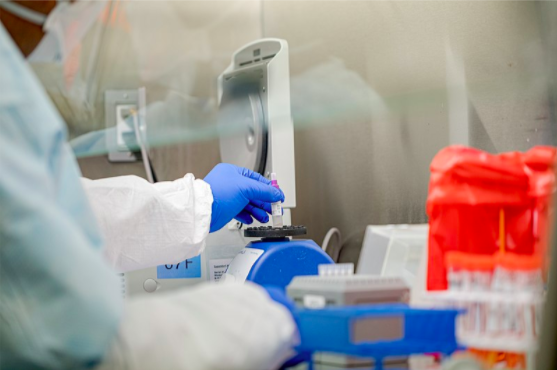As the current global pandemic spreads throughout the world scientists and doctors are constantly working on creating and improving the coronavirus tests.
Swabbing your nostril cavities or throat is the most common form of the diagnostic test. However, there is also an antibody test that requires a blood sample. “Diagnostic tests are used to detect if you are currently infected with COVID-19, while antibody tests detect if you have specific antibodies that are found in people who have had COVID-19 in the past,” said Nicholle Karmin, who works for the North Carolina Healthcare Association, via email.
By now many people have gone through the experience of getting tested for COVID-19 and know it is not the most pleasant experience.
“It didn’t really hurt but it was very uncomfortable and made my eyes tear up, and it was also really hard not to sneeze,” said Genevieve Fontenot, a junior at Leesville via text.
“I have gotten the test two times so far since coming to campus, just as a precaution, and it is definitely not my favorite thing to do,” said James Apisai, a college freshman at Appalachian State University, via text.
Luckily the testing field is full of innovation — saliva testing is a new diagnostic test method that has the potential to be much easier, safer, and more efficient for both patients and healthcare workers, involving just spitting into a tube.
Other important aspects that are not specifically about the tests are also improving. “One thing I think we can expect to see more of is pool testing – it’s a way to increase how many tests are completed daily while conserving testing resources. Pool testing is not really meant for people who have COVID-19 symptoms, but rather individuals who are asymptomatic or presymptomatic,” said Karmin.
She also explained that some universities are periodically sampling sewage from different dorms to check for traces of the virus. These things and more are helping detect and take action against the virus the best way possible.
Since these tests and results are so important, it is equally important to know how accurate they are.
“The accuracy depends on the type of test (self-administered versus healthcare worker administered), the test brand, when you get the test after exposure to someone known to have COVID-19, and if the test was administered correctly,” said Karmin. “Generally, the diagnostic tests tend to have better accuracy than the antibody tests.”
While these factors are certainly things to keep in mind, if you get tested at a trustworthy doctor’s office or carefully do it yourself, results should correctly tell if you have the virus or not and what next steps you might need to take.
COVID-19 has affected everyone in some way or another, and it is important to remember that there are many people working hard to combat the issues that are arising and provide the care people need.

Hi! My name is Gretchen and I am a senior editor and SEO editor for The Mycenaean. I love to travel and listen to music.

Leave a Reply